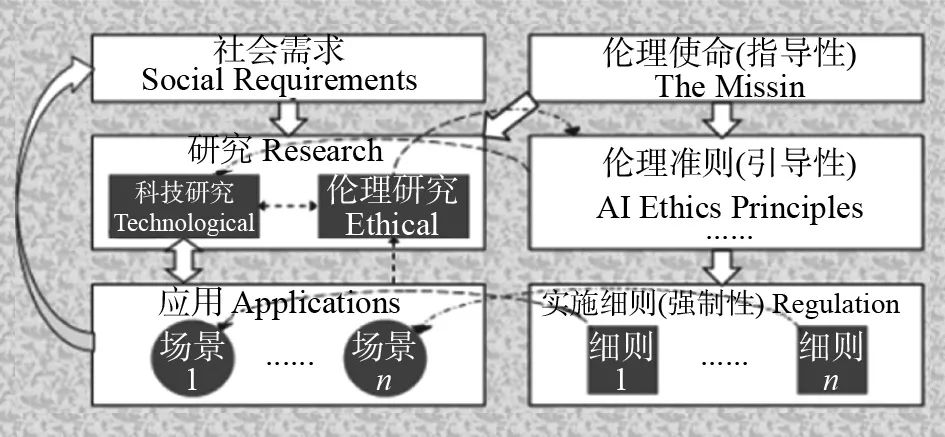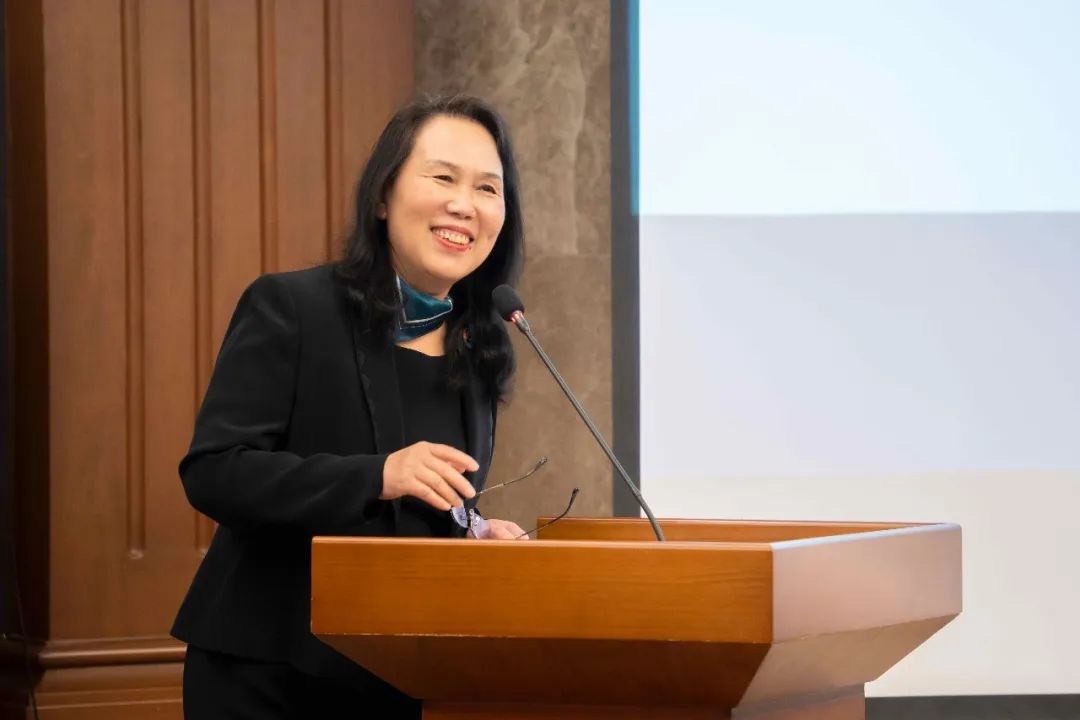China Issues AI Ethical Governance Proposals: Countries Should Establish Guidelines, Norms And Accountability Mechanisms
China Issues AI Ethical Governance Proposals: Countries Should Establish Guidelines, Norms And Accountability Mechanisms
Reporter Jiang Lin On November 17, the official website of the Ministry of Foreign Affairs released the "China's Position Document on Strengthening the Ethical Governance of Artificial Intelligence", which put forward a number of proposals in terms of artificial intelligence technology supervision, research and development, use and international cooperation.
Nandu News reporter Jiang Lin On November 17, the official website of the Ministry of Foreign Affairs released the "China's Position Document on Strengthening the Ethical Governance of Artificial Intelligence", which put forward a number of proposals in terms of artificial intelligence technology supervision, research and development, use and international cooperation. The document proposes that the subjects of artificial intelligence research and development should strengthen self-discipline on artificial intelligence research and development activities to ensure that artificial intelligence is always under human control.
According to Xinhua News Agency, on the 16th local time, Chinese disarmament ambassador Li Song led a delegation to attend the 2022 Conference of the States Parties to the United Nations Convention on Specific Conventional Weapons held in Geneva, Switzerland, and submitted the above documents to the General Assembly.
"As the most representative disruptive technology, artificial intelligence has brought potential huge development dividends to human society, its uncertainty may bring many global challenges and even trigger fundamental ethical concerns." The document reads, "At the ethical level, the international community is generally worried that if it is not regulated, the misuse and abuse of artificial intelligence technology may damage human dignity and equality, violate human rights and basic freedoms, aggravate discrimination and prejudice, impact the existing legal system, etc., and have a profound impact on government management, national defense construction, social stability, and global governance."
In order to achieve the goal of "ensure the safety, reliability, controllability of artificial intelligence and better empowering global sustainable development", China has put forward a number of proposals in terms of artificial intelligence technology supervision, research and development, use and international cooperation.
In terms of supervision, governments of all countries should establish and improve artificial intelligence ethical standards, norms and accountability mechanisms; gradually establish and improve artificial intelligence ethical norms, laws and regulations and policy systems, form artificial intelligence ethical guidelines, and establish scientific and technological ethical review and supervision systems; gradually establish an artificial intelligence ethical system that conforms to their own national conditions, and improve the artificial intelligence ethical governance system and mechanism with multi-party participation and collaborative governance.
In terms of R&D, governments of various countries should require R&D entities to strengthen self-discipline on artificial intelligence R&D activities to ensure that artificial intelligence is always under human control; strive to ensure that the algorithms in the artificial intelligence R&D process are safe and controllable; strive to improve the data quality of the artificial intelligence R&D process; strengthen ethical review of data acquisition and algorithm development to avoid possible data acquisition and algorithm bias.
In terms of use, governments of all countries should prohibit the use of artificial intelligence technologies and related applications that violate laws and regulations, ethics and standards; strengthen the argumentation and evaluation of artificial intelligence products and services before use, and promote the mechanism of artificial intelligence ethics training; strictly follow international or regional norms to process personal information, improve the mechanism for revoking personal data authorization, and oppose the illegal collection and use of personal information; attach importance to public artificial intelligence ethics education, and guide all sectors of society to consciously abide by artificial intelligence ethics standards and norms.
In terms of international cooperation, governments of all countries should ensure that all countries share the benefits of artificial intelligence technology, promote all countries to participate in the discussion of major issues of international artificial intelligence ethics and rule-making, oppose the construction of exclusive groups and maliciously obstructing the development of technology in other countries; strengthen ethical supervision of international cooperation research activities in the field of artificial intelligence; and promote the formation of an international artificial intelligence governance framework and standard norms with broad consensus on the premise of fully respecting the principles and practices of artificial intelligence governance in various countries.
Li Song said that China constructively participated in the process of the "Lawful Autonomous Weapon System" government expert group under the framework of the "Specific Conventional Weapons Convention" and put forward a position document on the issue of regulating the military application of artificial intelligence in December last year. This time, China further put forward a position document on the issue of artificial intelligence ethics, aiming to promote the understanding and attention of all countries on relevant issues, better empower global sustainable development, and enhance the common well-being of all mankind. China is willing to work with the international community to continuously improve and strengthen global governance in the field of artificial intelligence and actively build a community with a shared future for mankind.
Full text of "China's Position Document on Strengthening the Ethical Governance of Artificial Intelligence"
1. As the most representative disruptive technology, artificial intelligence has brought potential huge development dividends to human society, while its uncertainty may bring many global challenges and even arouse fundamental ethical concerns. At the ethical level, the international community is generally worried that if not regulated, the misuse and abuse of artificial intelligence technology may damage human dignity and equality, violate human rights and basic freedoms, aggravate discrimination and prejudice, impact the existing legal system, etc., and have a profound impact on government management, national defense construction, social stability and global governance.
China has always been committed to building a community with a shared future for mankind in the field of artificial intelligence, actively advocates the concepts of "people-oriented" and "intelligent to goodness", and advocates enhancing countries' understanding of the ethical issues of artificial intelligence, ensuring that artificial intelligence is safe, reliable and controllable, better empower global sustainable development, and enhance the common well-being of all mankind. To achieve this goal, China has upheld the concept of consultation, joint construction and sharing, and promoted international artificial intelligence ethical governance.
2. In December 2021, China issued the "State Document on Regulating the Military Application of Artificial Intelligence", calling on all parties to abide by national or regional artificial intelligence ethics and moral norms. China now combines its own policy practices in the field of scientific and technological ethics and refers to relevant beneficial achievements of the international community, and puts forward the following proposals from the aspects of artificial intelligence technology supervision, research and development, use and international cooperation:
(I) Supervision
Governments of all countries should adhere to ethics first, establish and improve the ethical norms, norms and accountability mechanisms of artificial intelligence, clarify the responsibilities and power boundaries of relevant artificial intelligence entities, fully respect and protect the legitimate rights and interests of various groups, and promptly respond to relevant domestic and international ethical concerns.
Governments of all countries should attach importance to the research on basic theoretical issues of artificial intelligence ethics and laws, gradually establish and improve artificial intelligence ethical norms, laws and regulations and policy systems, form artificial intelligence ethics guidelines, establish scientific and technological ethics review and supervision systems, and strengthen artificial intelligence security assessment and control capabilities.
Governments of all countries should enhance bottom-line thinking and risk awareness, strengthen the analysis and judgment of potential ethical risks of artificial intelligence technology, gradually establish an effective risk warning mechanism, adopt agile governance, classified and hierarchical management, and continuously improve risk control and disposal capabilities.
Governments of all countries should base themselves on the stage of artificial intelligence development and social and cultural characteristics, follow the laws of scientific and technological innovation, gradually establish an artificial intelligence ethics system that conforms to their own national conditions, and improve the system and mechanism of artificial intelligence ethics governance with multi-party participation and collaborative governance.
(II) R&D
Governments of various countries should require R&D entities to strengthen their self-discipline on artificial intelligence R&D activities, actively integrate ethics into all aspects of the artificial intelligence R&D process, avoid the use of immature technologies that may have serious negative consequences, and ensure that artificial intelligence is always under human control.
Governments of various countries should require R&D entities to strive to ensure that the algorithms in the artificial intelligence R&D process are safe and controllable, and continuously improve transparency, interpretability and reliability in the algorithm design, implementation, application and other links, and gradually realize auditable, supervisable, traceable, predictable and trustworthy.
Governments of all countries should require R&D entities to work hard to improve the data quality of the artificial intelligence R&D process, and strictly abide by the data security regulations, ethics and related legal standards of the country in the process of data collection, storage, and use, and improve the completeness, timeliness, consistency, normativeness and accuracy of data.
Governments of various countries should require R&D entities to strengthen ethical review of data collection and algorithm development, fully consider differentiated demands, avoid possible data collection and algorithm bias, and strive to achieve universality, fairness and non-discrimination of artificial intelligence systems.
(III) Use
Governments of all countries should prohibit the use of artificial intelligence technologies and related applications that violate laws and regulations, ethics and standards, strengthen the quality monitoring and use evaluation of used artificial intelligence products and services, and study and formulate emergency mechanisms and loss compensation measures.
Governments of all countries should strengthen the demonstration and evaluation of artificial intelligence products and services before use, promote the mechanism of artificial intelligence ethics training, and relevant personnel should fully understand the functions, characteristics, limitations, potential risks and consequences of artificial intelligence technology, and have the necessary professional qualities and skills.
Governments of all countries should ensure the privacy and data security of personal information during the use of artificial intelligence products and services, strictly follow international or regional norms to process personal information, improve the mechanism for revoking personal data authorization, and oppose the illegal collection and use of personal information.
Governments of all countries should attach importance to public artificial intelligence ethics education, ensure the public's right to know and effective participation, give full play to the role of social groups related to science and technology, guide all sectors of society to consciously abide by artificial intelligence ethical standards and norms, and improve their awareness of artificial intelligence ethics.
(IV) International Cooperation
Governments of all countries should encourage cross-country, cross-field and cross-cultural exchanges and cooperation in the field of artificial intelligence, ensure that all countries share the benefits of artificial intelligence technology, promote all countries to participate in the discussion of major issues of international artificial intelligence ethics and rule-making, and oppose the construction of exclusive groups and maliciously obstructing the development of technology in other countries.
Governments of all countries should strengthen ethical supervision of international cooperative research activities in the field of artificial intelligence, and relevant scientific and technological activities should comply with the artificial intelligence ethical management requirements of the countries in which all parties are located, and pass the corresponding artificial intelligence ethical review.
China calls on the international community to reach an international agreement on the ethics of artificial intelligence on the basis of universal participation, and promote the formation of an international artificial intelligence governance framework and standard norms with broad consensus on the premise of fully respecting the principles and practices of artificial intelligence governance in various countries.





